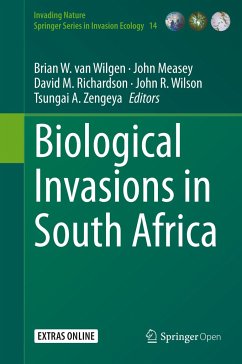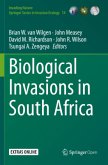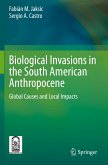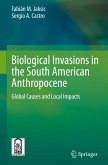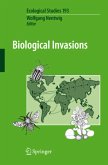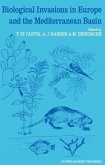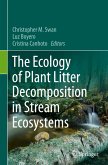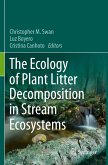Biological Invasions in South Africa
Herausgegeben:van Wilgen, Brian W.; Measey, John; Richardson, David M.; Wilson, John R.; Zengeya, Tsungai A.
Biological Invasions in South Africa
Herausgegeben:van Wilgen, Brian W.; Measey, John; Richardson, David M.; Wilson, John R.; Zengeya, Tsungai A.
- Gebundenes Buch
- Merkliste
- Auf die Merkliste
- Bewerten Bewerten
- Teilen
- Produkt teilen
- Produkterinnerung
- Produkterinnerung
This open access volume presents a comprehensive account of all aspects of biological invasions in South Africa, where research has been conducted over more than three decades, and where bold initiatives have been implemented in attempts to control invasions and to reduce their ecological, economic and social effects. It covers a broad range of themes, including history, policy development and implementation, the status of invasions of animals and plants in terrestrial, marine and freshwater environments, the development of a robust ecological theory around biological invasions, the…mehr
Andere Kunden interessierten sich auch für
![Biological Invasions in South Africa Biological Invasions in South Africa]() Biological Invasions in South Africa38,99 €
Biological Invasions in South Africa38,99 €![Biological Invasions in the South American Anthropocene Biological Invasions in the South American Anthropocene]() Fabián M. JaksicBiological Invasions in the South American Anthropocene160,49 €
Fabián M. JaksicBiological Invasions in the South American Anthropocene160,49 €![Biological Invasions in the South American Anthropocene Biological Invasions in the South American Anthropocene]() Fabián M. JaksicBiological Invasions in the South American Anthropocene160,49 €
Fabián M. JaksicBiological Invasions in the South American Anthropocene160,49 €![Biological Invasions Biological Invasions]() Wolfgang Nentwig (ed.)Biological Invasions112,99 €
Wolfgang Nentwig (ed.)Biological Invasions112,99 €![Biological Invasions in Europe and the Mediterranean Basin Biological Invasions in Europe and the Mediterranean Basin]() F. di Castri / A.J. Hansen / M Debussche (Hgg.)Biological Invasions in Europe and the Mediterranean Basin242,99 €
F. di Castri / A.J. Hansen / M Debussche (Hgg.)Biological Invasions in Europe and the Mediterranean Basin242,99 €![The Ecology of Plant Litter Decomposition in Stream Ecosystems The Ecology of Plant Litter Decomposition in Stream Ecosystems]() The Ecology of Plant Litter Decomposition in Stream Ecosystems119,99 €
The Ecology of Plant Litter Decomposition in Stream Ecosystems119,99 €![The Ecology of Plant Litter Decomposition in Stream Ecosystems The Ecology of Plant Litter Decomposition in Stream Ecosystems]() The Ecology of Plant Litter Decomposition in Stream Ecosystems119,99 €
The Ecology of Plant Litter Decomposition in Stream Ecosystems119,99 €-
-
-
This open access volume presents a comprehensive account of all aspects of biological invasions in South Africa, where research has been conducted over more than three decades, and where bold initiatives have been implemented in attempts to control invasions and to reduce their ecological, economic and social effects. It covers a broad range of themes, including history, policy development and implementation, the status of invasions of animals and plants in terrestrial, marine and freshwater environments, the development of a robust ecological theory around biological invasions, the effectiveness of management interventions, and scenarios for the future. The South African situation stands out because of the remarkable diversity of the country, and the wide range of problems encountered in its varied ecosystems, which has resulted in a disproportionate investment into both research and management. The South African experience holds many lessons for other parts of the world, and this book should be of immense value to researchers, students, managers, and policy-makers who deal with biological invasions and ecosystem management and conservation in most other regions.
Hinweis: Dieser Artikel kann nur an eine deutsche Lieferadresse ausgeliefert werden.
Hinweis: Dieser Artikel kann nur an eine deutsche Lieferadresse ausgeliefert werden.
Produktdetails
- Produktdetails
- Invading Nature - Springer Series in Invasion Ecology 14
- Verlag: Springer / Springer International Publishing / Springer, Berlin / Stellenbosch University
- Artikelnr. des Verlages: 978-3-030-32393-6
- 1st ed. 2020
- Seitenzahl: 1000
- Erscheinungstermin: 11. März 2020
- Englisch
- Abmessung: 241mm x 160mm x 59mm
- Gewicht: 1658g
- ISBN-13: 9783030323936
- ISBN-10: 3030323935
- Artikelnr.: 57593444
- Herstellerkennzeichnung Die Herstellerinformationen sind derzeit nicht verfügbar.
- Invading Nature - Springer Series in Invasion Ecology 14
- Verlag: Springer / Springer International Publishing / Springer, Berlin / Stellenbosch University
- Artikelnr. des Verlages: 978-3-030-32393-6
- 1st ed. 2020
- Seitenzahl: 1000
- Erscheinungstermin: 11. März 2020
- Englisch
- Abmessung: 241mm x 160mm x 59mm
- Gewicht: 1658g
- ISBN-13: 9783030323936
- ISBN-10: 3030323935
- Artikelnr.: 57593444
- Herstellerkennzeichnung Die Herstellerinformationen sind derzeit nicht verfügbar.
Brian W. van Wilgen is Emeritus Professor at the DST-NRF Centre of Excellence for Invasion Biology at Stellenbosch University, South Africa. His interests include applied ecology and the development of evidence-based approaches to conservation management in Africa and beyond. His work has focussed mainly on fire ecology and biological invasions, and he has published over 250 peer-reviewed journal papers and book chapters. John Measey is Chief Researcher at the NRF-DST Centre of Excellence for Invasion Biology, based in the Department of Botany and Zoology at Stellenbosch University, South Africa. He is author/co-author of over 200 peer-reviewed journal papers and chapters in edited books. His research focuses on animal invasions, especially those of reptiles and amphibians. David M. Richardson is Director of the DST-NRF Centre of Excellence for Invasion Biology and a Distinguished Professor of Ecology at Stellenbosch University, South Africa. His research focuses mainly on plant invasions, especially trees and shrubs. He is author/co-author of over 430 peer-reviewed journal papers and chapters in edited books. He has edited/co-edited six books, including Fifty years of invasion ecology (Wiley-Blackwell, 2011) and is co-author of Invasion Dynamics (Oxford University Press; 2017). John R. Wilson is the science lead for the South African National Biodiversity Institute's Biological Invasions Directorate. He is author/co-author of over 120 papers in peer-reviewed journals with a particular focus on invasion science, and was the lead author of a recent book on detecting and responding to alien plant incursions (Cambridge University Press; 2017). He is a member of the IUCN's Invasive Species Specialist Group, and works across science, management, and policy (e.g. as a lead editor of South Africa's National Status Report on Biological Invasions, and current chair of the South African Alien Species Risk Analysis Review Panel). Tsungai Zengeya is a senior researcher in the Biological Invasions Directorate at the South African National Biodiversity Institute and leads up the team producing the South African National Status Report on Biological Invasions. His research interests are in aquatic ecology, with a focus on understanding the impacts of, and managing and preventing biological invasions. His is also a core team member of the DST-NRF Centre of Excellence for Invasion Biology at University of Pretoria, South Africa.
PART 1 BACKGROUND
1. Biological invasions in South Africa: An overview
Brian W. van Wilgen, G. John Measey, David M. Richardson, John R. Wilson and Tsungai A. Zengeya
2. A brief, selective history of researchers and research initiatives related to biological invasions in South Africa
Brian W. van Wilgen
PART 2 BIOLOGICAL INVASIONS IN SOUTH AFRICA
3. The biogeography of South African terrestrial plant invasions
David M. Richardson, Llewellyn C. Foxcroft, Guillaume Latombe, David C. Le Maitre, Mathieu Rouget and John R. Wilson
4. Invasive alien aquatic plants in freshwater ecosystems
Martin P. Hill, Julie A. Coetzee, Grant D. Martin, Rosali Smith and Emily F. Strange
5. Terrestrial Vertebrate Invasions in South Africa
G. John Measey, Cang Hui and Michael Somers
6. Alien freshwater fauna in South Africa
Olaf L.F. Weyl, Bruce Ellender, Ryan J Wassermann, Marliese Truter, Tatenda Dalu, Tsungai A. Zengeya and Nico J. Smit
7. Alien terrestrial invertebrates in South Africa
Charlene Janion-Scheepers and Charles L. Griffiths
8. Biological invasions in South Africa's offshore sub-Antarctic territories
Michelle Greve, Charles Eric Otto von der Meden, and Charlene Janion-Scheepers
9. Coastal invasions: The South African context
Tamara B. Robinson, Koebraa Peters and Ben Brooker
10. Pathogens of vertebrate animals as invasive species: Insights from South Africa
Lesley van Helden, Paul D. van Helden and Christina Meiring
11. Biological invasions in South Africa's urban ecosystems: Patterns, processes, impacts and management
Luke J. Potgieter, Errol Douwes, Mirijam Gaertner, G. John Measey, Trudy Paap and David M. Richardson
PART 3 DRIVERS OF INVASION
12. South Africa's pathways of introduction and dispersal and how they have changed over time
Katelyn T. Faulkner, Amy Burness, Marcus Byrne, Sabrina Kumschick, Koebraa Peters, Mark P. Robertson, Davina L. Saccaggi, Olaf L. F. Weyl and Vivienne Williams
13. The role of environmental factors in promoting and limiting biological invasions in South Africa
John R. Wilson, Llewellyn C. Foxcroft, Sjirk Geerts, M. Timm Hoffman, Sandra MacFadyen, G. John Measey, Anthony Mills, David M. Richardson, Mark P. Robertson and Brian W. van Wilgen
14. Biotic interactions as mediators of biological invasions: Insights from South Africa
Johannes J. Le Roux, Susanna Clusella-Trullas, Thabiso M. Mokotjomela, Mario Mairal, David M. Richardson, Lisa Skein, John R. Wilson, Olaf L.F. Weyl and Sjirk Geerts
PART 4 IMPACTS OF INVASION
15. Impacts of invasions on terrestrial water resources in South Africa
David C. Le Maitre, James N. Blignaut, Alistair Clulow, Sebinasi Dzikiti, Colin S. Everson, Andre H. M. Görgens and Mark B. Gush
16. The impact of invasive alien plants on rangelands in South Africa
Timothy O'Connor and Brian W. van Wilgen
17. An evaluation of the impacts of alien species on biodiversity in South Africa using different methods
Tsungai A. Zengeya, Sabrina Kumschick, Olaf L. F. Weyl and Brian W. van Wilgen
PART 5 MANAGEMENT OF INVASIONS
18. Biological invasion policy and legislation development and implementation in South Africa
Peter Lukey and Jenny Hall
19. More than a century of biological control against invasive alien plants in South Africa: a synoptic view of what has been accomplished
Martin P. Hill, Vincent C. Moran, John H. Hoffmann, Stefan Neser, Helmuth G. Zimmermann, David O. Simelane, Hildegard Klein, Costas Zachariades, Alan R. Wood, Marcus J. Byrne, Iain D. Paterson, Grant D. Martin and Julie A. Coetzee
20. Analysing the risks posed by biological invasions to South Africa
Sabrina Kumschick, Llewellyn C. Foxcroft and John R. Wilson
21. The extent and effectiveness of alien plant control projects in South Africa
Brian W. van Wilgen, John R. Wilson, Andrew Wannenburgh and Llewellyn C. Foxcroft
22. Experience and lessons from alien and invasive animal control projects carried out in South Africa
Sarah J. Davies, Martine Jordaan, Minette Karsten, John. S. Terblanche, Andrew Turner, Nicola J. van Wilgen, Ruan Veldtman, Tsungai A. Zengeya and G. John Measey
23. Biological invasions and ecological restoration in South Africa
Patricia M. Holmes, Karen J. Esler, Mirijam Gaertner, Sjirk Geerts, Stuart A. Hall, Mlungele M. Nsikani, David M. Richardson and Sheunesu Ruwanza
24. The social dimensions of biological invasions in South Africa
Ross T. Shackleton, Ana Novoa, Charlie M. Shackleton and Christian A. Kull
25. Education, training and capacity building in the field of biological invasions in South Africa
Marcus J. Byrne, Dorette du Plessis, Philip J, Ivey, G. John Measey, Mark P. Robertson, Tamara B. Robinson and Kim N. Weaver.
PART 6 NEW INSIGHTS
26. South Africa as a donor of naturalized and invasive alien plants to other parts of the world
Petr Pysek, Jan Pergl, Mark van Kleunen, Wayne Dawson, Franz Essl, Holger Kreft, Patrick Weigelt, John R. Wilson, Marten Winter and David M. Richardson
27. South Africa as a donor of alien animals
G. John Measey, Tamara B. Robinson, Natasha Kruger, Tsungai A. Zengeya and Brett Hurley
28. Knowing-doing continuum or knowing-doing gap? Transferring research results to managers of biological invasions in South Africa.
Llewellyn C. Foxcroft, Brian W. van Wilgen, Brent Abrahams, Karen J. Eslar and Andrew Wannenburgh
29. Biological invasions as a component of South Africa's global change research effort
Nicola J. van Wilgen, Brian W. van Wilgen and Guy F. Midgley
30. South Africa's Centre for Invasion Biology: An experiment in invasion science for society
David M. Richardson, Brent Abrahams, Nelius Boshoff, Sarah J. Davies, G. John Measey and Brian W. van Wilgen
PART 7 THE WAY FORWARD
31. Potential futures of biological invasions in South Africa
John R. Wilson, G. John Measey, David M. Richardson, Brian W. van Wilgen, and Tsungai A. Zengeya
1. Biological invasions in South Africa: An overview
Brian W. van Wilgen, G. John Measey, David M. Richardson, John R. Wilson and Tsungai A. Zengeya
2. A brief, selective history of researchers and research initiatives related to biological invasions in South Africa
Brian W. van Wilgen
PART 2 BIOLOGICAL INVASIONS IN SOUTH AFRICA
3. The biogeography of South African terrestrial plant invasions
David M. Richardson, Llewellyn C. Foxcroft, Guillaume Latombe, David C. Le Maitre, Mathieu Rouget and John R. Wilson
4. Invasive alien aquatic plants in freshwater ecosystems
Martin P. Hill, Julie A. Coetzee, Grant D. Martin, Rosali Smith and Emily F. Strange
5. Terrestrial Vertebrate Invasions in South Africa
G. John Measey, Cang Hui and Michael Somers
6. Alien freshwater fauna in South Africa
Olaf L.F. Weyl, Bruce Ellender, Ryan J Wassermann, Marliese Truter, Tatenda Dalu, Tsungai A. Zengeya and Nico J. Smit
7. Alien terrestrial invertebrates in South Africa
Charlene Janion-Scheepers and Charles L. Griffiths
8. Biological invasions in South Africa's offshore sub-Antarctic territories
Michelle Greve, Charles Eric Otto von der Meden, and Charlene Janion-Scheepers
9. Coastal invasions: The South African context
Tamara B. Robinson, Koebraa Peters and Ben Brooker
10. Pathogens of vertebrate animals as invasive species: Insights from South Africa
Lesley van Helden, Paul D. van Helden and Christina Meiring
11. Biological invasions in South Africa's urban ecosystems: Patterns, processes, impacts and management
Luke J. Potgieter, Errol Douwes, Mirijam Gaertner, G. John Measey, Trudy Paap and David M. Richardson
PART 3 DRIVERS OF INVASION
12. South Africa's pathways of introduction and dispersal and how they have changed over time
Katelyn T. Faulkner, Amy Burness, Marcus Byrne, Sabrina Kumschick, Koebraa Peters, Mark P. Robertson, Davina L. Saccaggi, Olaf L. F. Weyl and Vivienne Williams
13. The role of environmental factors in promoting and limiting biological invasions in South Africa
John R. Wilson, Llewellyn C. Foxcroft, Sjirk Geerts, M. Timm Hoffman, Sandra MacFadyen, G. John Measey, Anthony Mills, David M. Richardson, Mark P. Robertson and Brian W. van Wilgen
14. Biotic interactions as mediators of biological invasions: Insights from South Africa
Johannes J. Le Roux, Susanna Clusella-Trullas, Thabiso M. Mokotjomela, Mario Mairal, David M. Richardson, Lisa Skein, John R. Wilson, Olaf L.F. Weyl and Sjirk Geerts
PART 4 IMPACTS OF INVASION
15. Impacts of invasions on terrestrial water resources in South Africa
David C. Le Maitre, James N. Blignaut, Alistair Clulow, Sebinasi Dzikiti, Colin S. Everson, Andre H. M. Görgens and Mark B. Gush
16. The impact of invasive alien plants on rangelands in South Africa
Timothy O'Connor and Brian W. van Wilgen
17. An evaluation of the impacts of alien species on biodiversity in South Africa using different methods
Tsungai A. Zengeya, Sabrina Kumschick, Olaf L. F. Weyl and Brian W. van Wilgen
PART 5 MANAGEMENT OF INVASIONS
18. Biological invasion policy and legislation development and implementation in South Africa
Peter Lukey and Jenny Hall
19. More than a century of biological control against invasive alien plants in South Africa: a synoptic view of what has been accomplished
Martin P. Hill, Vincent C. Moran, John H. Hoffmann, Stefan Neser, Helmuth G. Zimmermann, David O. Simelane, Hildegard Klein, Costas Zachariades, Alan R. Wood, Marcus J. Byrne, Iain D. Paterson, Grant D. Martin and Julie A. Coetzee
20. Analysing the risks posed by biological invasions to South Africa
Sabrina Kumschick, Llewellyn C. Foxcroft and John R. Wilson
21. The extent and effectiveness of alien plant control projects in South Africa
Brian W. van Wilgen, John R. Wilson, Andrew Wannenburgh and Llewellyn C. Foxcroft
22. Experience and lessons from alien and invasive animal control projects carried out in South Africa
Sarah J. Davies, Martine Jordaan, Minette Karsten, John. S. Terblanche, Andrew Turner, Nicola J. van Wilgen, Ruan Veldtman, Tsungai A. Zengeya and G. John Measey
23. Biological invasions and ecological restoration in South Africa
Patricia M. Holmes, Karen J. Esler, Mirijam Gaertner, Sjirk Geerts, Stuart A. Hall, Mlungele M. Nsikani, David M. Richardson and Sheunesu Ruwanza
24. The social dimensions of biological invasions in South Africa
Ross T. Shackleton, Ana Novoa, Charlie M. Shackleton and Christian A. Kull
25. Education, training and capacity building in the field of biological invasions in South Africa
Marcus J. Byrne, Dorette du Plessis, Philip J, Ivey, G. John Measey, Mark P. Robertson, Tamara B. Robinson and Kim N. Weaver.
PART 6 NEW INSIGHTS
26. South Africa as a donor of naturalized and invasive alien plants to other parts of the world
Petr Pysek, Jan Pergl, Mark van Kleunen, Wayne Dawson, Franz Essl, Holger Kreft, Patrick Weigelt, John R. Wilson, Marten Winter and David M. Richardson
27. South Africa as a donor of alien animals
G. John Measey, Tamara B. Robinson, Natasha Kruger, Tsungai A. Zengeya and Brett Hurley
28. Knowing-doing continuum or knowing-doing gap? Transferring research results to managers of biological invasions in South Africa.
Llewellyn C. Foxcroft, Brian W. van Wilgen, Brent Abrahams, Karen J. Eslar and Andrew Wannenburgh
29. Biological invasions as a component of South Africa's global change research effort
Nicola J. van Wilgen, Brian W. van Wilgen and Guy F. Midgley
30. South Africa's Centre for Invasion Biology: An experiment in invasion science for society
David M. Richardson, Brent Abrahams, Nelius Boshoff, Sarah J. Davies, G. John Measey and Brian W. van Wilgen
PART 7 THE WAY FORWARD
31. Potential futures of biological invasions in South Africa
John R. Wilson, G. John Measey, David M. Richardson, Brian W. van Wilgen, and Tsungai A. Zengeya
PART 1 BACKGROUND
1. Biological invasions in South Africa: An overview
Brian W. van Wilgen, G. John Measey, David M. Richardson, John R. Wilson and Tsungai A. Zengeya
2. A brief, selective history of researchers and research initiatives related to biological invasions in South Africa
Brian W. van Wilgen
PART 2 BIOLOGICAL INVASIONS IN SOUTH AFRICA
3. The biogeography of South African terrestrial plant invasions
David M. Richardson, Llewellyn C. Foxcroft, Guillaume Latombe, David C. Le Maitre, Mathieu Rouget and John R. Wilson
4. Invasive alien aquatic plants in freshwater ecosystems
Martin P. Hill, Julie A. Coetzee, Grant D. Martin, Rosali Smith and Emily F. Strange
5. Terrestrial Vertebrate Invasions in South Africa
G. John Measey, Cang Hui and Michael Somers
6. Alien freshwater fauna in South Africa
Olaf L.F. Weyl, Bruce Ellender, Ryan J Wassermann, Marliese Truter, Tatenda Dalu, Tsungai A. Zengeya and Nico J. Smit
7. Alien terrestrial invertebrates in South Africa
Charlene Janion-Scheepers and Charles L. Griffiths
8. Biological invasions in South Africa's offshore sub-Antarctic territories
Michelle Greve, Charles Eric Otto von der Meden, and Charlene Janion-Scheepers
9. Coastal invasions: The South African context
Tamara B. Robinson, Koebraa Peters and Ben Brooker
10. Pathogens of vertebrate animals as invasive species: Insights from South Africa
Lesley van Helden, Paul D. van Helden and Christina Meiring
11. Biological invasions in South Africa's urban ecosystems: Patterns, processes, impacts and management
Luke J. Potgieter, Errol Douwes, Mirijam Gaertner, G. John Measey, Trudy Paap and David M. Richardson
PART 3 DRIVERS OF INVASION
12. South Africa's pathways of introduction and dispersal and how they have changed over time
Katelyn T. Faulkner, Amy Burness, Marcus Byrne, Sabrina Kumschick, Koebraa Peters, Mark P. Robertson, Davina L. Saccaggi, Olaf L. F. Weyl and Vivienne Williams
13. The role of environmental factors in promoting and limiting biological invasions in South Africa
John R. Wilson, Llewellyn C. Foxcroft, Sjirk Geerts, M. Timm Hoffman, Sandra MacFadyen, G. John Measey, Anthony Mills, David M. Richardson, Mark P. Robertson and Brian W. van Wilgen
14. Biotic interactions as mediators of biological invasions: Insights from South Africa
Johannes J. Le Roux, Susanna Clusella-Trullas, Thabiso M. Mokotjomela, Mario Mairal, David M. Richardson, Lisa Skein, John R. Wilson, Olaf L.F. Weyl and Sjirk Geerts
PART 4 IMPACTS OF INVASION
15. Impacts of invasions on terrestrial water resources in South Africa
David C. Le Maitre, James N. Blignaut, Alistair Clulow, Sebinasi Dzikiti, Colin S. Everson, Andre H. M. Görgens and Mark B. Gush
16. The impact of invasive alien plants on rangelands in South Africa
Timothy O'Connor and Brian W. van Wilgen
17. An evaluation of the impacts of alien species on biodiversity in South Africa using different methods
Tsungai A. Zengeya, Sabrina Kumschick, Olaf L. F. Weyl and Brian W. van Wilgen
PART 5 MANAGEMENT OF INVASIONS
18. Biological invasion policy and legislation development and implementation in South Africa
Peter Lukey and Jenny Hall
19. More than a century of biological control against invasive alien plants in South Africa: a synoptic view of what has been accomplished
Martin P. Hill, Vincent C. Moran, John H. Hoffmann, Stefan Neser, Helmuth G. Zimmermann, David O. Simelane, Hildegard Klein, Costas Zachariades, Alan R. Wood, Marcus J. Byrne, Iain D. Paterson, Grant D. Martin and Julie A. Coetzee
20. Analysing the risks posed by biological invasions to South Africa
Sabrina Kumschick, Llewellyn C. Foxcroft and John R. Wilson
21. The extent and effectiveness of alien plant control projects in South Africa
Brian W. van Wilgen, John R. Wilson, Andrew Wannenburgh and Llewellyn C. Foxcroft
22. Experience and lessons from alien and invasive animal control projects carried out in South Africa
Sarah J. Davies, Martine Jordaan, Minette Karsten, John. S. Terblanche, Andrew Turner, Nicola J. van Wilgen, Ruan Veldtman, Tsungai A. Zengeya and G. John Measey
23. Biological invasions and ecological restoration in South Africa
Patricia M. Holmes, Karen J. Esler, Mirijam Gaertner, Sjirk Geerts, Stuart A. Hall, Mlungele M. Nsikani, David M. Richardson and Sheunesu Ruwanza
24. The social dimensions of biological invasions in South Africa
Ross T. Shackleton, Ana Novoa, Charlie M. Shackleton and Christian A. Kull
25. Education, training and capacity building in the field of biological invasions in South Africa
Marcus J. Byrne, Dorette du Plessis, Philip J, Ivey, G. John Measey, Mark P. Robertson, Tamara B. Robinson and Kim N. Weaver.
PART 6 NEW INSIGHTS
26. South Africa as a donor of naturalized and invasive alien plants to other parts of the world
Petr Pysek, Jan Pergl, Mark van Kleunen, Wayne Dawson, Franz Essl, Holger Kreft, Patrick Weigelt, John R. Wilson, Marten Winter and David M. Richardson
27. South Africa as a donor of alien animals
G. John Measey, Tamara B. Robinson, Natasha Kruger, Tsungai A. Zengeya and Brett Hurley
28. Knowing-doing continuum or knowing-doing gap? Transferring research results to managers of biological invasions in South Africa.
Llewellyn C. Foxcroft, Brian W. van Wilgen, Brent Abrahams, Karen J. Eslar and Andrew Wannenburgh
29. Biological invasions as a component of South Africa's global change research effort
Nicola J. van Wilgen, Brian W. van Wilgen and Guy F. Midgley
30. South Africa's Centre for Invasion Biology: An experiment in invasion science for society
David M. Richardson, Brent Abrahams, Nelius Boshoff, Sarah J. Davies, G. John Measey and Brian W. van Wilgen
PART 7 THE WAY FORWARD
31. Potential futures of biological invasions in South Africa
John R. Wilson, G. John Measey, David M. Richardson, Brian W. van Wilgen, and Tsungai A. Zengeya
1. Biological invasions in South Africa: An overview
Brian W. van Wilgen, G. John Measey, David M. Richardson, John R. Wilson and Tsungai A. Zengeya
2. A brief, selective history of researchers and research initiatives related to biological invasions in South Africa
Brian W. van Wilgen
PART 2 BIOLOGICAL INVASIONS IN SOUTH AFRICA
3. The biogeography of South African terrestrial plant invasions
David M. Richardson, Llewellyn C. Foxcroft, Guillaume Latombe, David C. Le Maitre, Mathieu Rouget and John R. Wilson
4. Invasive alien aquatic plants in freshwater ecosystems
Martin P. Hill, Julie A. Coetzee, Grant D. Martin, Rosali Smith and Emily F. Strange
5. Terrestrial Vertebrate Invasions in South Africa
G. John Measey, Cang Hui and Michael Somers
6. Alien freshwater fauna in South Africa
Olaf L.F. Weyl, Bruce Ellender, Ryan J Wassermann, Marliese Truter, Tatenda Dalu, Tsungai A. Zengeya and Nico J. Smit
7. Alien terrestrial invertebrates in South Africa
Charlene Janion-Scheepers and Charles L. Griffiths
8. Biological invasions in South Africa's offshore sub-Antarctic territories
Michelle Greve, Charles Eric Otto von der Meden, and Charlene Janion-Scheepers
9. Coastal invasions: The South African context
Tamara B. Robinson, Koebraa Peters and Ben Brooker
10. Pathogens of vertebrate animals as invasive species: Insights from South Africa
Lesley van Helden, Paul D. van Helden and Christina Meiring
11. Biological invasions in South Africa's urban ecosystems: Patterns, processes, impacts and management
Luke J. Potgieter, Errol Douwes, Mirijam Gaertner, G. John Measey, Trudy Paap and David M. Richardson
PART 3 DRIVERS OF INVASION
12. South Africa's pathways of introduction and dispersal and how they have changed over time
Katelyn T. Faulkner, Amy Burness, Marcus Byrne, Sabrina Kumschick, Koebraa Peters, Mark P. Robertson, Davina L. Saccaggi, Olaf L. F. Weyl and Vivienne Williams
13. The role of environmental factors in promoting and limiting biological invasions in South Africa
John R. Wilson, Llewellyn C. Foxcroft, Sjirk Geerts, M. Timm Hoffman, Sandra MacFadyen, G. John Measey, Anthony Mills, David M. Richardson, Mark P. Robertson and Brian W. van Wilgen
14. Biotic interactions as mediators of biological invasions: Insights from South Africa
Johannes J. Le Roux, Susanna Clusella-Trullas, Thabiso M. Mokotjomela, Mario Mairal, David M. Richardson, Lisa Skein, John R. Wilson, Olaf L.F. Weyl and Sjirk Geerts
PART 4 IMPACTS OF INVASION
15. Impacts of invasions on terrestrial water resources in South Africa
David C. Le Maitre, James N. Blignaut, Alistair Clulow, Sebinasi Dzikiti, Colin S. Everson, Andre H. M. Görgens and Mark B. Gush
16. The impact of invasive alien plants on rangelands in South Africa
Timothy O'Connor and Brian W. van Wilgen
17. An evaluation of the impacts of alien species on biodiversity in South Africa using different methods
Tsungai A. Zengeya, Sabrina Kumschick, Olaf L. F. Weyl and Brian W. van Wilgen
PART 5 MANAGEMENT OF INVASIONS
18. Biological invasion policy and legislation development and implementation in South Africa
Peter Lukey and Jenny Hall
19. More than a century of biological control against invasive alien plants in South Africa: a synoptic view of what has been accomplished
Martin P. Hill, Vincent C. Moran, John H. Hoffmann, Stefan Neser, Helmuth G. Zimmermann, David O. Simelane, Hildegard Klein, Costas Zachariades, Alan R. Wood, Marcus J. Byrne, Iain D. Paterson, Grant D. Martin and Julie A. Coetzee
20. Analysing the risks posed by biological invasions to South Africa
Sabrina Kumschick, Llewellyn C. Foxcroft and John R. Wilson
21. The extent and effectiveness of alien plant control projects in South Africa
Brian W. van Wilgen, John R. Wilson, Andrew Wannenburgh and Llewellyn C. Foxcroft
22. Experience and lessons from alien and invasive animal control projects carried out in South Africa
Sarah J. Davies, Martine Jordaan, Minette Karsten, John. S. Terblanche, Andrew Turner, Nicola J. van Wilgen, Ruan Veldtman, Tsungai A. Zengeya and G. John Measey
23. Biological invasions and ecological restoration in South Africa
Patricia M. Holmes, Karen J. Esler, Mirijam Gaertner, Sjirk Geerts, Stuart A. Hall, Mlungele M. Nsikani, David M. Richardson and Sheunesu Ruwanza
24. The social dimensions of biological invasions in South Africa
Ross T. Shackleton, Ana Novoa, Charlie M. Shackleton and Christian A. Kull
25. Education, training and capacity building in the field of biological invasions in South Africa
Marcus J. Byrne, Dorette du Plessis, Philip J, Ivey, G. John Measey, Mark P. Robertson, Tamara B. Robinson and Kim N. Weaver.
PART 6 NEW INSIGHTS
26. South Africa as a donor of naturalized and invasive alien plants to other parts of the world
Petr Pysek, Jan Pergl, Mark van Kleunen, Wayne Dawson, Franz Essl, Holger Kreft, Patrick Weigelt, John R. Wilson, Marten Winter and David M. Richardson
27. South Africa as a donor of alien animals
G. John Measey, Tamara B. Robinson, Natasha Kruger, Tsungai A. Zengeya and Brett Hurley
28. Knowing-doing continuum or knowing-doing gap? Transferring research results to managers of biological invasions in South Africa.
Llewellyn C. Foxcroft, Brian W. van Wilgen, Brent Abrahams, Karen J. Eslar and Andrew Wannenburgh
29. Biological invasions as a component of South Africa's global change research effort
Nicola J. van Wilgen, Brian W. van Wilgen and Guy F. Midgley
30. South Africa's Centre for Invasion Biology: An experiment in invasion science for society
David M. Richardson, Brent Abrahams, Nelius Boshoff, Sarah J. Davies, G. John Measey and Brian W. van Wilgen
PART 7 THE WAY FORWARD
31. Potential futures of biological invasions in South Africa
John R. Wilson, G. John Measey, David M. Richardson, Brian W. van Wilgen, and Tsungai A. Zengeya
"This resource will be valuable both to seasoned practitioners or academic researchers as well as to students just embarking on their careers. ... Biological Invasions in South Africa will be seen as a pivotal milestone on the path to achieving these positive outcomes." (Philip E. Hulme, South African Journal of Science, Vol. 117 (1-2), 2021)

